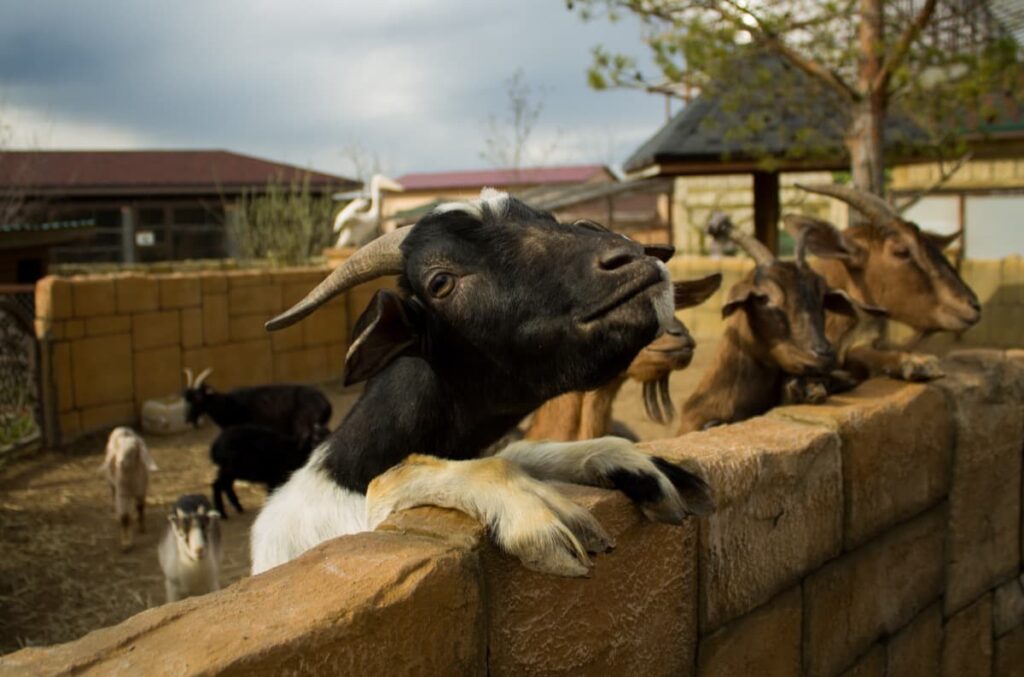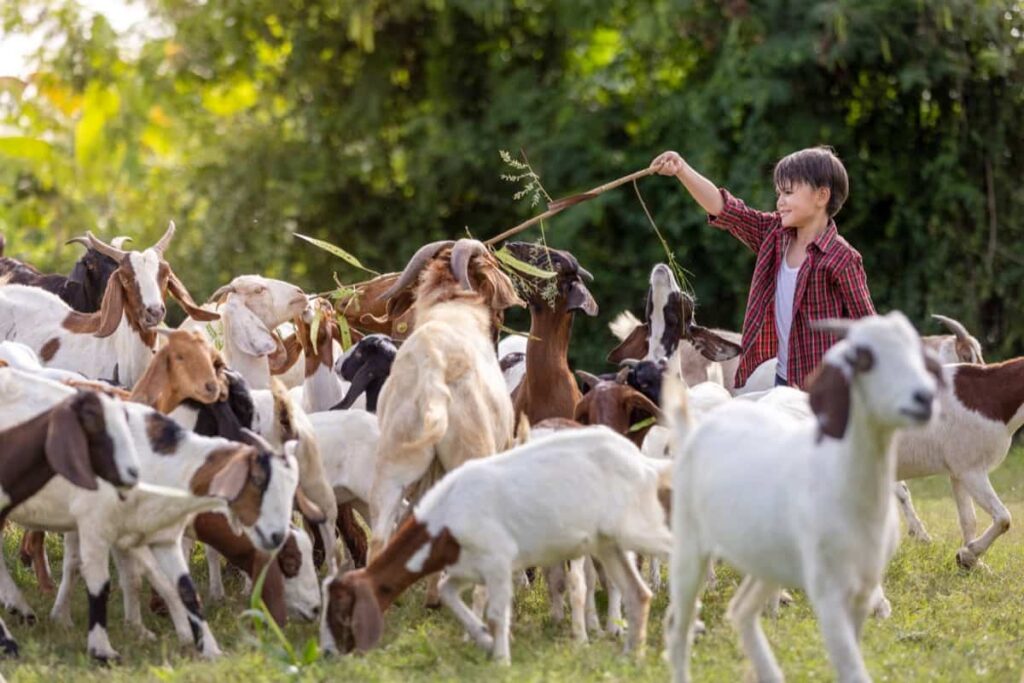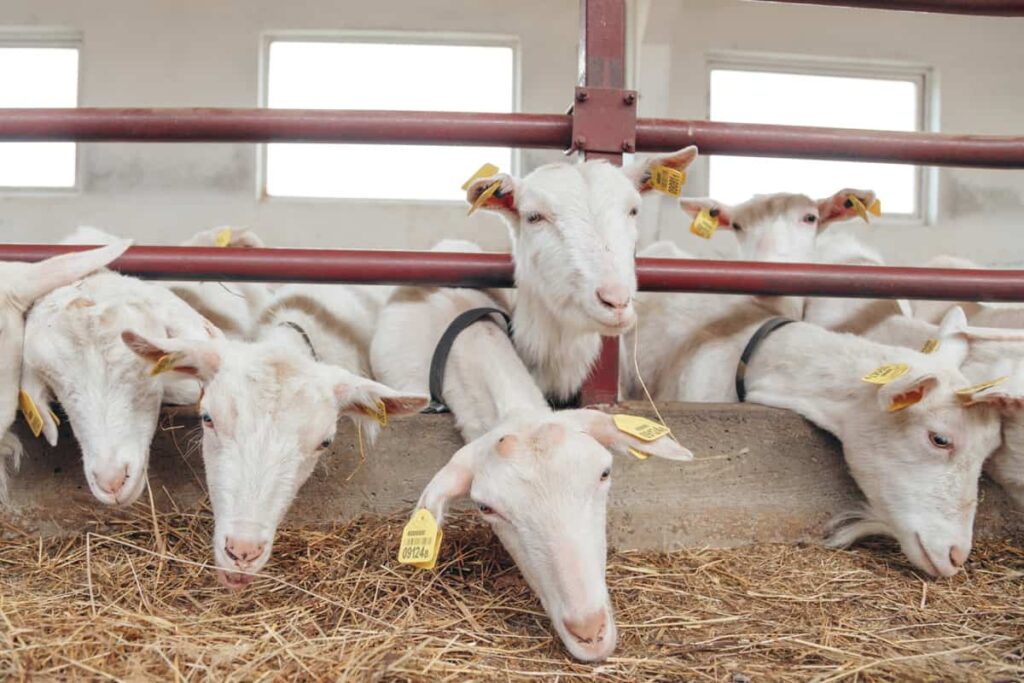Goat farming has a long history in Arunachal Pradesh and has played an integral role in the livelihoods of its people. With its favorable climate and vast grazing lands, this state provides an ideal environment for rearing goats.

Advantages of Goat Farming in Arunachal Pradesh
- Goat farming plays a crucial role in the agricultural economy of Arunachal Pradesh. The state’s geographical terrain and climatic conditions make it ideal for goat rearing.
- Goat farming plays a crucial role in Arunachal Pradesh’s economy by providing employment opportunities, generating income, utilizing natural resources efficiently, and promoting self-sufficiency in food production.
- Goat farming has always been an integral part of the traditional agricultural practices in Arunachal Pradesh.
- Goats are known for their adaptability to harsh weather conditions. Arunachal Pradesh experiences diverse climatic variations throughout the year, including heavy rainfall and cold winters. Goats can withstand extreme weather conditions, making them suitable for this region.
- Furthermore, goat meat is highly popular among the locals and tourists visiting Arunachal Pradesh. It is considered a delicacy and often features prominently in the traditional cuisines of the region.
Goat Breeds Suitable for Arunachal Pradesh
- Arunachal Pradesh, with its diverse terrain and climatic conditions, provides a suitable environment for goat farming. Several goat breeds thrive in this region due to their adaptability and resilience. One such breed is the Jamunapari, known for its large size and high milk production.
- The Sirohi breed is another excellent choice for goat farming in this region. Known for their robust nature, these goats can withstand harsh weather conditions and are relatively disease-resistant.
- Another breed is the Bengal goat, native to West Bengal but now found in abundance across Arunachal Pradesh. These goats are known for their adaptability and resilience, making them well-suited for this region’s hilly terrains and fluctuating temperatures.
- Another prominent breed found in Arunachal Pradesh is the Assam hill goat. Hailing from neighboring Assam, these goats have adapted well to the rugged landscapes of Arunachal Pradesh. Known for their hardiness and ability to survive on minimal resources, they have become popular among local farmers.
Feeding and Fencing Requirements for Raising Goats
- Proper feeding ensures the health and productivity of your goats. Goats have a diverse diet, so providing them with a balanced mix of forage, grasses, and concentrates is essential.
- Fencing is another vital component that cannot be overlooked. It helps create secure boundaries for your goats and protects them from predators. A sturdy wire mesh or barbed wire fence will help keep your goats safe.
- Water is an essential requirement for goats as they always need access to clean drinking water. Ensure you have a reliable water source nearby or install a watering system within their grazing area.
- To maintain healthy growth and production, it’s necessary to feed your goats twice a day with adequate amounts of nutrition-rich feed. Monitor their intake regularly to prevent overfeeding or underfeeding.
- Ensure the enclosure is large enough for the number of goats you plan to raise. Also, check the fences regularly for any damages or weak spots that could compromise the safety of your animals.
- Ensure sufficient water troughs are placed strategically throughout the grazing area so all goats can access fresh water whenever needed.
In case you missed it: Best Practices for Disease Prevention and Management in Goats: Strategies for Maintaining a Healthy Herd

Vaccination and Health Care of Goats in Arunachal Pradesh
- Ensuring the health and well-being of your goats is crucial in goat farming. Regular vaccination schedules should be followed to protect against common infections like clostridium, pneumonia, and foot-and-mouth disease.
- A balanced diet that includes quality hay or pasture grazing and supplemental grains or pellets ensures that goats receive essential nutrients for growth and immunity.
- Maintaining clean living conditions is critical for preventing the spread of diseases among goats. Regular cleaning of barns, bedding replacement, and removal of manure reduces exposure to pathogens.
- Regular veterinary care is vital for maintaining healthy goats. Engage an experienced veterinarian who can vaccinate against common diseases in the region. Additionally, regular deworming must be carried out to control internal parasites.
- Disease control measures are vital to ensure optimal health conditions for your goats. Regular vaccinations and proper hygiene practices can prevent outbreaks and protect your herd.
Government Policies & Schemes for Goat Farming in Arunachal Pradesh
- Government policies and schemes support farmers through financial assistance or training programs. Staying updated with these initiatives can greatly benefit aspiring or existing farmers.
- The government of Arunachal Pradesh has implemented several policies and schemes to support and promote goat farming in the state. These initiatives aim to improve farmers’ livelihoods, generate rural income, and boost the agricultural sector.
- Schemes like Rashtriya Krishi Vikas Yojana (RKVY) focus on providing training programs and technical support to goat farmers. These initiatives help educate farmers about modern breeding techniques, improved animal healthcare practices, efficient feed management systems, and marketing strategies.
- Furthermore, various subsidies are available for infrastructure development in goat farming, such as fencing materials or the construction of sheds. The government also organizes awareness campaigns and exhibitions where experts share their knowledge with aspiring entrepreneurs interested in starting a goat farm.
- These policies and schemes are crucial in encouraging individuals to venture into the lucrative goat farming business by providing them with the necessary resources and knowledge for success.
Disease Control Measures in Goat Farming in Arunachal Pradesh
One crucial aspect of disease control in goat farming is regular vaccination. Vaccines help prevent various infectious diseases that can greatly impact the productivity and profitability of a goat farm. Farmers in Arunachal Pradesh must consult with veterinary experts or local animal husbandry departments to develop a proper vaccination schedule for their goats.
Maintaining good hygiene practices on the farm significantly affects disease prevention. Regular cleaning and disinfection of sheds and equipment are necessary to minimize the risk of infections spreading among goats. Additionally, providing clean drinking water and nutritious feed helps boost their immune system, making them less susceptible to diseases.
In case you missed it: Goat Breeding and Genetics for Improved Productivity and Disease Resistance

Proper fencing around grazing areas can also contribute to disease control by preventing contact between healthy goats and those carrying contagious illnesses. Separating sick or infected animals from the rest of the herd can help contain any potential outbreaks. The government has implemented various policies and schemes related to livestock healthcare in Arunachal Pradesh. Farmers can avail themselves of these resources for guidance on disease prevention and treatment options for goat farming.
Conclusion
Goat farming is the practice of raising goats for various purposes, such as milk, meat, and fiber production. Goats are highly adaptable animals that can thrive in various climatic conditions, making them well-suited for the diverse landscapes of Arunachal Pradesh. This means that goat farming can be practiced throughout the state, providing employment opportunities to rural communities.
- Goat Milking Practices and Equipment: A Beginner’s Guide
- Goat Farming for Fiber: Producing Mohair and Cashmere
- Maximizing Goat Milk Production: Tips for Dairy Goat Farmers
- Goat Farming as a Family Business: Strategies for Success
- Profitable Kenya Goat Breeds for Commercial Dairy and Meat Business
- Unlock the Secrets of Oberhasli Goat: Discover Raising and Management Practices
- Ultimate Guide to Myotonic Goats: Explore Profile to Raising
- Unlock the Secrets of Rove Goat: Discover Management Practices
- Ultimate Guide to Malwa Goat: Explore from Origin to Management Practices
My near future plan or say dream project is on toe!